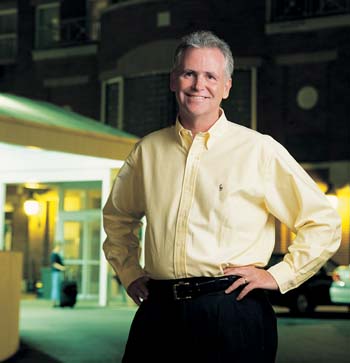 |
 |
| current issue |  |
past issues |  |
send a letter/news |  |
address update |  |
advertise |  |
about us |  |
alumni home |
Features
Suite SuccessPage 4 of 4
 A symbolic silver yo-yo helps Kevin Hanley '78 keep things in perspective.
A symbolic silver yo-yo helps Kevin Hanley '78 keep things in perspective.
|
"I'm always curious about new ideas where people display excellence," Coraine says, adding he found the best Snow Cone in New Orleans. "The best doughnut is in Westwood, Calif., right by UCLA at Stan's Doughnuts," he says. "Stan Berman has been doing it for 45 years. He is one of my heroes. I don't ask for the recipe but rather spend time with the proprietor and get a sense of how they can make such a great product."
Staying ahead of the competition takes a lot of energy, something he seems to possess in abundance. He starts his day in his office overlooking Union Square Park every morning at 6:30 and reads six newspapers in an hour. On Wednesdays, Coraine checks out the food section online for every major newspaper in the country. Before noon each day, after he's caught up with the news and responded to e-mail and telephone calls from the day before, Coraine stops in at nine restaurants, taking the pulse, he says, of how the operations are doing. Is everybody ready for lunch? Do any regulars have reservations? (If so, he makes a point of dropping by to say hello.)

|
Coraine also has weekly coaching sessions with the chefs, strategy sessions with managers and staff meetings at each of the eateries. The biggest challenge? Trying to find the best managers. And, of course, enough time to get everything done. Some days, he puts in eight hours; others, it's 12. But rarely does he work six days in a week, and he expects his staff to follow his lead.
"There are people who say that in order to be in the restaurant business, you have to work 80 hours a week. My partners and I don't agree with that. We ask our people to work really hard five days a week then take time off and do something for themselves."
Attitude Readjustment
During his first job out of UNH, Bob Webster '80 was taught that there are never problems, only challenges. While he admits that's "kind of a hokey readjustment to how you look at problems," he's never forgotten it.
Hokey or not, that perspective has been very useful in reflecting on the events of a significant day in 1988. Webster was director of real estate for Ritz-Carlton at the time, having moved into the real-estate side of the business after holding management positions at the Plaza Hotel in New York and Westin Copley Place in Boston. What happened was this: He got fired.
When you're director of real estate, Webster explains, your job is to bring in capital. But in the fall of 1988, the Japanese treaty minister "shut off the spigot," and the market collapsed. Webster was caught in the line of fire. "At the time, it was the worst day in my professional career, and the months that followed as I searched for a new job were not much better," he says. "The ultimate irony in hindsight is that it turned out to be the best day in my life."
How so? Well, first of all, getting fired opened the way to the job he has now—advising hotel broker Hodges Ward Elliott on nearly $800 million worth of hotel deals. Since 1998, he has represented clients in transactions totaling almost $3 billion, and Real Estate Forum Magazine has ranked him the third most productive real estate broker in the country. But he also learned volumes from the experience. With those lessons came a perspective that he is able to share with his staff.
"It was a horrible day. But I tell my boys, what appears as one thing is often something else," he says. "It was relevant not just then but in all of life. That's when I joined my present company, and it's been a phenomenal ride ever since." ~
Freelancer writer Jody Record '95 is a non-traditional graduate of UNH with a B.A. degree in English and journalism.
Page: < Prev 1 2 3 4Easy to print version
blog comments powered by Disqus

